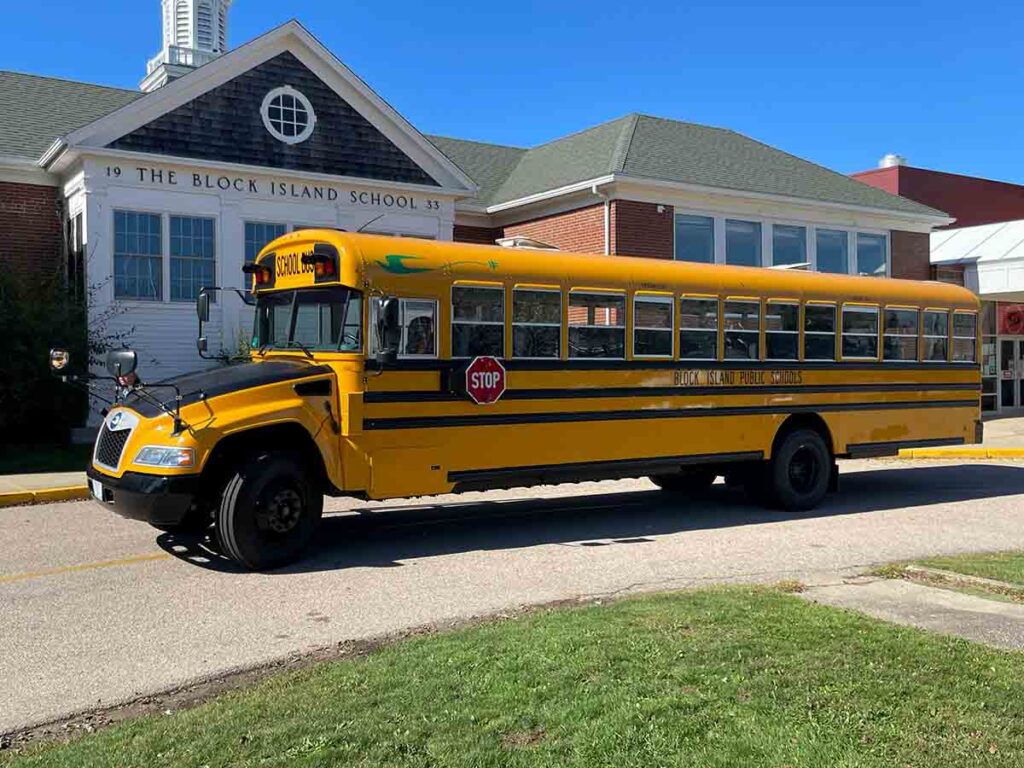
Rhode Island’s Block Island Utility District is receiving a new electric bucket truck this month thanks to the generosity of one of its original members—and the family of the late Donald McCluskey is hoping that his legacy inspires others living in electric cooperative communities to help fund clean energy projects.
The truck donation is among $3 million in contributions from McCluskey for clean energy community projects over the past four years, said Jeffery Wright, the founding CEO of Block Island Utility District. The distribution co-op is a former investor-owned utility that became an electric cooperative in 2018 and joined NRECA a year later.
“Don’s impact on the co-op is making a tremendous impact on the island,” said Wright. “His quiet contributions not only improved our overall performance, helping us control our costs, but they also are helping to turn the island into a model environment for proving beneficial electrification concepts and reducing our overall environmental impact.”
At 33,000 pounds, the full-sized bucket truck from Terex Utilities has a charging range of 135 miles. The 55-foot boom has the reach to handle most work required on the co-op’s system, and with just 35 miles of paved roads in the 10-square mile community, Wright says it is ideal for daily use.
“With a sticker price of $620,000, there is no way we could have made the purchase on our own,” said Wright. “We can charge it once or twice a week, and it is ready and available anytime we need it.”

The co-op’s new bucket truck will be seen around the island by many of its 700 to 800 permanent residents. McCluskey also bought an electric school bus to transport local students, replacing costly diesel fuel with electric power costs of about $100 a month.
“During the summers, when the bus is not in use, we can back feed power from it to meet about 1% of our peak, shaving demand for power,” said Wright.
While McCluskey’s community support came without expectations for repayment, he always made it clear that any revenues or savings generated from his contributions be reinvested in green energy projects offering direct benefits to residents and visitors to Block Island.
“We take those revenues and we put them into a capital fund,” said Wright. “He also gave money for a pilot program for solar panels on poles. We will install them to see if the panels will hold up in our weather and use the power they produce as no-cost electricity to feed into our grid.”

McCluskey, a former electrical engineer who founded and operated a successful electronics consulting firm, was 100 years old when Wright visited him for their first and only face-to-face meeting at his Block Island home in 2021. He sat on his porch and listened with keen interest to details of the modernization and upgrades that Wright, his staff and contractors pursued soon after the co-op was established. He smiled at hearing how some of his previous gifts were helping to make Block Island better, said Wright.
“He funded a 90-kilowatt solar array we built on the roof of our building. He also paid to have solar arrays installed on 20 affordable housing units and subsidized installation of heat pumps on more than 80 of the island’s homes,” said Wright.
Block Island was the Connecticut native’s adopted hometown. McCluskey sailed there with childhood friends and visited several times with his wife before building his retirement home there in 1978.
With his home off the grid and beyond the investor-owned utility’s lines, he adopted solar early and tried unsuccessfully to harness wind power, replacing noisy generators with the technology available at the time. Before he finally got connected to power lines, McCluskey hosted neighbors at his home while they waited for power to be restored during many outages. Once the co-op was founded, his interest in its operations offered him opportunities to actively express his commitment to cleaner energy.
The projects he funded were undertaken with little fanfare, with McCluskey requesting no acknowledgement and preservation of his privacy. It wasn’t until after his death last October at age 101 that his children began offering public details of his financial support.
“His gifts for green energy were an anonymous end-of-life effort,” said Martha McCluskey, one of his three surviving children. “He recognized that his generation was not leaving the planet or the island in good condition. He hoped to inspire a broader commitment to addressing the climate crisis, bridging the divisions that are hindering that work.”
But Block Islanders will learn more about the late World War II veteran this summer when the electric bus and the electric bucket truck are decorated for the annual Independence Day parade. Wright plans to drive the truck, with Martha McCluskey in the passenger seat.
A message permanently painted on the vehicle will note her father’s interest and support of the co-op: “This truck, and the solar energy used to power it, are tributes to the vision and generosity of Don McCluskey. May his example inspire others!”
Derrill Holly is a staff writer for NRECA.